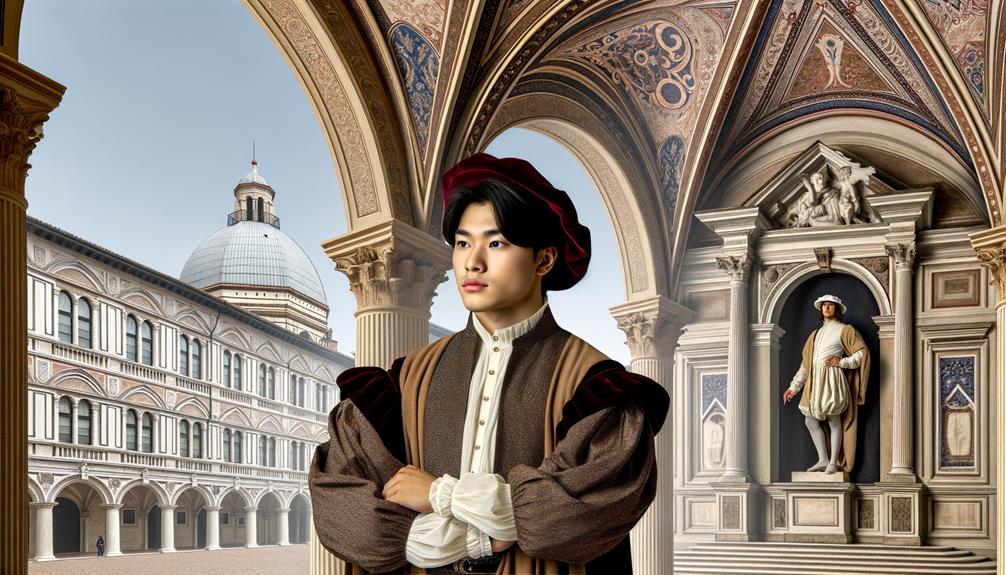Leonardo Name Meaning and Origin
The name Leonardo originates from Old High German elements 'lewo,' meaning 'lion,' and 'harti,' meaning 'brave' or 'hardy.' It signifies nobility and strength, embodying the valor of medieval European warriors. The name gained prominence in the Italian Peninsula during the Middle Ages and remains popular across Italy, Spain, and the United States.
Famous personalities like Leonardo da Vinci and Leonardo DiCaprio illustrate the name's association with creativity and intellectual prowess. Its continued appeal underscores a legacy of fortitude and cultural depth that transcends generations.
Discover more about this timeless name's rich historical and cultural context.

Key Takeaways
- Leonardo is derived from Old High German elements 'lewo' (lion) and 'harti' (brave, hardy).
- The name signifies courage, leadership, and resilience, symbolizing a "brave lion."
- It gained prominence in medieval Europe and is deeply associated with notable figures like Leonardo da Vinci.
- Leonardo embodies creativity, intellectual prowess, and artistic mastery, transcending generations.
- The name remains popular in Italy, Spain, and the US, frequently appearing in top baby name lists.
Historical Roots
Rooted in the rich tapestry of European history, the name Leonardo finds its origins in the Old Germanic elements 'leon' meaning 'lion' and 'hard' meaning 'brave' or 'hardy.' This name encapsulates the valor and fortitude emblematic of medieval European warriors and nobility.
Initially prevalent among the Germanic tribes, it spread across the continent through migration and conquest. During the Middle Ages, the name gained prominence, especially within the Italian Peninsula, due in part to its adoption by influential figures and ruling families.
The cultural and historical significance of the name was further solidified by the Renaissance, an era that saw Leonardo da Vinci emerge as a paragon of artistic and intellectual achievement, thereby embedding the name deeply in Western cultural heritage.
Etymology and Meaning
Building upon its historical roots, the etymology of the name Leonardo is derived from the Old High German elements 'lewo' (lion) and 'harti' (brave, hardy), encapsulating a sense of nobility and strength.
The name evolved through the centuries, with its earliest forms appearing in the medieval period. Linguistically, 'lewo' signifies not only the physical prowess of the lion but also its symbolic association with courage and leadership. 'Harti,' meanwhile, underscores a robust and resilient character.
This combination reflects a name that is both powerful and enduring. As it progressed from Old High German to Latin and then to Italian, the name retained its fundamental connotations, becoming widespread in European cultures and maintaining its regal and valiant essence.
Cultural Significance
The cultural importance of the name Leonardo is deeply intertwined with its historical usage and the prominent figures who have borne this name, most especially Leonardo da Vinci, whose contributions to art, science, and innovation have left an indelible mark on Western civilization.
Originating from the Old High German elements 'leon' (lion) and 'hard' (brave, hardy), the name encapsulates traits of strength and resilience. Historically, it has been associated with creativity, intellectual prowess, and artistic mastery.
The name's widespread use across various cultures, particularly in Italy and Spain, underscores its linguistic versatility and enduring appeal. In literature and media, Leonardo evokes a legacy of ingenuity and cultural depth that transcends generations, reinforcing its timeless relevance.
Famous Leonardos
Among the many illustrious individuals named Leonardo, Leonardo da Vinci stands as a paragon of Renaissance genius, whose multifaceted contributions to art, science, and engineering continue to influence contemporary thought and innovation. Born in 1452, his polymathic achievements include the iconic paintings 'Mona Lisa' and 'The Last Supper,' as well as visionary anatomical sketches and mechanical designs.
Below is a table showcasing famous Leonardos:
| Leonardo | Notable Contributions |
|---|---|
| da Vinci | Renaissance art and scientific inventions |
| DiCaprio | Acclaimed actor and environmental activist |
| Fibonacci | Introduced the Fibonacci sequence to Europe |
| Sciascia | Renowned Italian writer and intellectual |
Each Leonardo has profoundly impacted diverse fields, underscoring the name's rich historical and cultural legacy.
Modern Popularity
In contemporary times, the name Leonardo continues to enjoy widespread popularity, bolstered by its rich historical roots and the enduring legacies of several iconic figures who have borne the name. Derived from the Old High German 'Leonhard,' meaning 'brave lion,' Leonardo has retained its appeal across centuries.
The global admiration for individuals like Leonardo da Vinci and contemporary celebrities such as actor Leonardo DiCaprio has further solidified its place in modern culture. Statistically, the name frequently appears in the top-ranking lists for baby names in countries like Italy, Spain, and the United States.
Its timeless combination of historical significance and modern-day relevance ensures that Leonardo remains a favored choice for parents worldwide.
Conclusion
To sum up, the name Leonardo, infused with historical significance and rich linguistic roots, serves as a tapestry of cultural heritage. Its etymological origins in Old Germanic and Latin, paired with its historical spread, emphasize its lasting appeal.
The name's echo throughout history, embodied by individuals such as Leonardo da Vinci, emphasizes its timeless charm. Like a guiding light through the centuries, Leonardo continues to enchant, mirroring both a celebrated past and modern significance.






